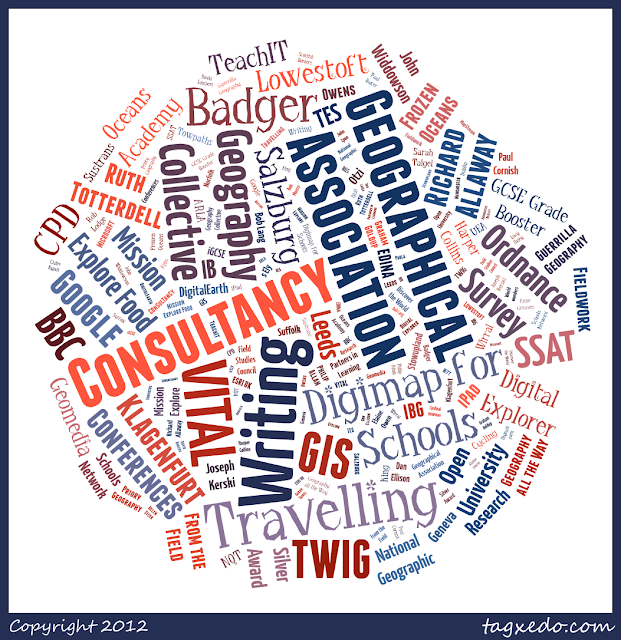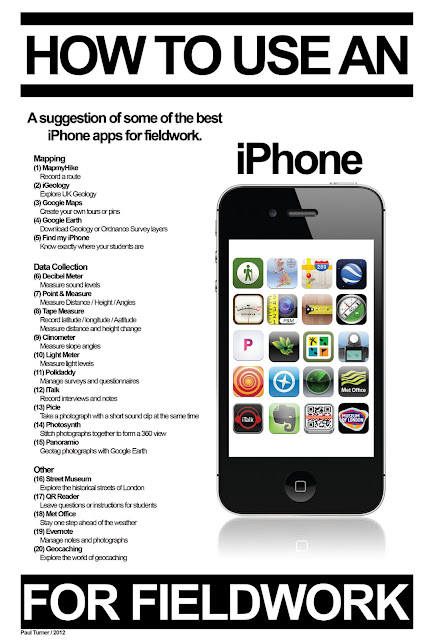A year ago, I was just coming to terms with the (premature) end of my job at the
Geographical Association after three wonderful years, and decided to try things out as a
freelance geographer: author, consultant, trainer and whatever else people would pay me to do.
Here's a visual summary of what I've been up to, made with Tagxedo
As it happens, my extensive networking over the previous decade meant that I had a few projects to start in on, the Geography Collective was going from strength to strength, and I was fortunate to get a temporary contract managing the OU's VITAL CPD portal. Paula Owens involved me in a writing job for the BBC, and together we produced a major resource for the Digimap for Schools for EDINA. Thanks also to Richard Allaway, who asked me to write content for his Geography all the Way website and collaborate on an innovative series of eBooks, the first of which is now available to download from the iBookstore.
The writing work I did for the RGS-IBG's From the Field, working to translate the research of PhD colleagues, was later awarded a GA Silver Award, as was the Geography Collective's MissionExplore.net. Our books had won a National Trust / Hay Festival Outdoor Book of the Year Award, and we were also runners-up at the Educational Writers' Awards, with the ceremony held at the House of Commons. I produced a set of resources on the Frozen Oceans for Jamie Buchanan Dunlop which are now used in hundreds of schools, and we've worked on a few more things as well...
I wrote a book for Badger publishing: a GCSE Grade Booster, which was published in April. I also have a children's book on Otzi the Ice Man due for publication in November 2012.
Karl Donert involved me in a range of EU projects, and steered another one to successfully gaining funding. This took me to Europe several times, and my passport will continue to get regular use for the next few years. The digitalearth project took me to Manchester for the GA's conference where I met the tireless Joseph Kerski. Paul Baker involved me in Independent School events.
I've found myself in many different hotels once again, and there have been plenty of highlights, and also lots of lonely days staring at a screen willing ideas. Some moments that stick out from the last year involve:
- splashing along muddy towpaths on the outskirts of Leeds on my bike writing 'missions' for SUSTRANS
- standing on the viewpoint at over 3000m on the Aiguille du' Midi with Richard Allaway and staring at the clouds we'd just passed through in the cablecar
- crunching through the snow in Salzburg on a Sunday morning as the churches in the city competed with each other to have the loudest bells
- presenting at BETT and then heading across London to the Outdoor Show to join the Geography Collective on their stand
- sailing up the Solent on a tall ship, and taking the helm
- walking on the frozen ice of the Worthersee (don't try this at home kids)
- attending the book launch of Mission:Explore Food at Hackney City Farm
- walking around the Olympic Park with John Widdowson and a school group
Oh, and I have a book manuscript co-written with John Widdowson, which has to be on the desk of Ruth Totterdell at the GA first thing Monday morning !
Here's to my 2nd year of freelancing. Unless I get an offer to entice me back into the classroom somewhere in Norfolk, I'll carry on doing what I'm doing for a while yet.
And I have a reasonable number of diary slots through into 2013 if you fancy getting me involved with something you have planned...



















.PNG)







.JPG)


